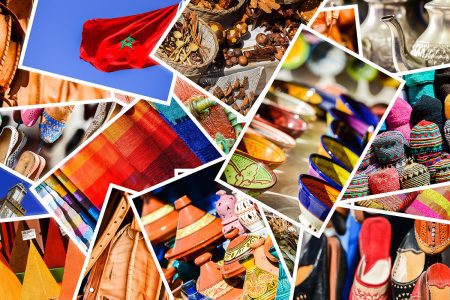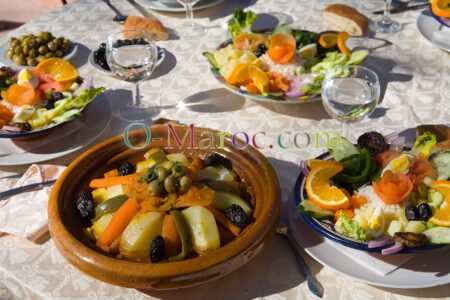Begging in Morocco is omnipresent: discreet begging between Moroccans, sometimes aggressive begging towards tourists. This is undoubtedly the main complaint of tourists, this feeling of being chased and attacked, mainly by groups of children, but also by adults, who insist on offering to guide you, for example, and then demand payment for doing so.
A still very poor country
Around a third of the population still lives around the relative poverty line of 2 dollars a day. The average wage for a worker in rural areas is around 50 dirhams a day, the minimum wage is barely over 2,000 dirhams a month, and only a quarter of the population benefits from a social security system that only very sparingly compensates for serious illnesses. All this to say that begging, and its corollary, almsgiving, is unfortunately still a necessity in daily life. It’s not just for tourists.
Almsgiving, or zakat, is one of the pillars of Islam, a sacred duty for every Muslim. This charity is done through the mosques, the shura (redistribution of a tenth of one’s earnings) and simply by giving alms in the street. This means that a beggar who asks a Moroccan will quite easily receive 1 or 2 dirhams, or at least a blessing, if they don’t want to give. As for the European, he passes by without saying anything, embarrassed. Or gives, but too much.
Knowing how to give
When you want to give, always remember that a worker earns around 50 dirhams a day, and measure your alms against that wage, not against your standard of living.
You will also often see poor men and women walking past a restaurant, asking for the leftovers on the tables, holding out a plastic bag or two. It’s shocking to our eyes, but what’s really shocking is that they’re poor enough to need to do it. Food in Morocco, again, is sacred, and you don’t throw it away. You can give them your bread, the meat you didn’t eat in the dish, and if you don’t, the restaurant owner will do it for you.
You can also contact the teacher or the kaid in a village and give them what you’ve brought to give away. They will know how to distribute it.
Similarly, the man who offers himself as a guide is doing a job. He expects to be paid a small fee, a few dirhams, even if he has been totally useless to you. This is what he will receive from a Moroccan in the same circumstances. But if you don’t want him to guide you, tell him firmly, right away, and don’t let him follow you. The magic word “Sir, sir” repeated several times should restore your peace of mind. This is not begging in the original sense of the word, but rather “odd jobs”.
To sum up :
- understand that begging is an endemic problem and not just for tourists
- carry small change, 1 or 2 dirham coins, so that you can give to those who ask you for it in the street
- don’t hesitate to give bread or food when you are in a restaurant
- never, ever give to a child (or in exchange for work, such as washing the car), but always to an adult.
Knowing how not to give

Nor are you obliged to give to every beggar. But in this case, do as the Moroccans do, refuse nicely. I always have a carefully empty trouser pocket, so that I can turn it over and say “walou les dirhams” (I don’t have any change) with a smile. That’s for another time…
It’s also possible to give too much. Above all, it means giving badly, to the wrong people, and encouraging begging. This is what leads to abuse, which is real, but concentrated in highly touristy areas.
Do not encourage child begging
If there were only one rule, it would be this: never ever give directly to a child, always to an adult, or better still, to an association.
Unfortunately, it’s true that begging has become a profession for many children, and tourists don’t hesitate to give them 1 euro, simply because they’re cute, because they ask for it, or to get rid of them. And when you refuse to give them money, they start asking for a pen or a notebook.
For school? No, to resell them, or simply for fun. But how many tourists have widely distributed their largesse to children, encouraging them in this “profession” and destabilising the family structure?
Donate to charities
The Oasis de Mezgarne has set up an association, Ayour de Mezgarne, which organises food and clothing distributions to nomads in la région du Saghro and supports the school in the neighbouring village of Timganine. If you wish, you can take part in these donations during a tour, either by bringing clothing, books or school equipment from France, or by buying food locally. And if you’re interested in other associations, there’s the Tazzarine town portal, which lists them all.
 A typo or syntax error? You can select the text and hit Ctrl+Enter to send us a message. Thank you! If this post interested you, maybe you can also leave a comment. We'd love to exchange with you !
A typo or syntax error? You can select the text and hit Ctrl+Enter to send us a message. Thank you! If this post interested you, maybe you can also leave a comment. We'd love to exchange with you !




